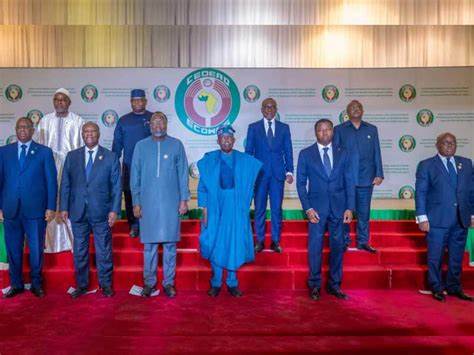The Economic Community of West African States (ECOWAS) recently lifted the sanctions it imposed on Burkina Faso, Mali and Niger, citing humanitarian consideration as its reasons aimed at protecting the people and the regional integration of the 15 member nations.
The ECOWAS at the end of its extra ordinary session in Abuja, directed that sanctions related to land and borders closure, banking, freezing of assets of leaders and all service transactions, including electricity supply by Nigeria to Niger and travel bans on military officials involved in the coup amongst others, were lifted with immediate effects.
The lifting of the sanctions and opening of further discussions have shown the level of commitment by the ECOWAS leaders, under the leadership of Nigeria’s President Bola Ahmed Tinubu, to explore diplomatic ways of resolving the misunderstanding that followed the military takeover in the affected countries.
The decision by the leaders of Burkina Faso, Mali and Niger to announce their withdrawal from ECOWAS was hinged on what they termed the inhumane and illegal sanctions imposed on them following the coups had resulted in the stoppage or suspension of all development projects and programmes by multilateral agencies worth over $500 million.
Other implications of the sanctions identified by ECOWAS centered on socio-economic, political, security and humanitarian that may draw back the regional bloc integration and development objectives with direct consequence on the citizens.
The President of the ECOWAS Commission, Omar Tourey in a communiqué, urged leaders of the three countries to reconsider their decision to leave ECOWAS given the benefits to member nations and their citizens from the regional bloc and encourage them to resort to dialogue, negotiations and mediation available within the framework of ECOWAS protocols to address all their concerns.
The ECOWAS extra ordinary session resolved to invite Burkina Faso, Mali, Niger and Guinea to a technical and consultative meeting on all security related discussions and expressed the hope that the affected nations will give peace a chance in moving the regional bloc forward for the desired objectives of the regional body.
The ECOWAS commission should as a matter of urgency convene the meeting of ministers of finance and defence as mandated by the extra-ordinary meeting to come up with modalities for financing and equipping counterterrorism forces that will help restore peace to member nations when the need arises as was the case in the 1990s with the Economic Community of West African States Monitoring Group (ECOMOG).
The Chairman of the ECOWAS Heads of State and Government, Nigeria’s President Tinubu emphasized at the meeting that “everything ECOWAS did was in hopes of persuading our brothers that there exists a better path, a path that would lead to genuine improvement of their peoples’ welfare through democratic good governance.’’
The efforts of the founding fathers of ECOWAS like former Nigeria Head of State, General Yakubu Gowon to resolve the problem should be commended. There is also the need for further dialogue with the four nations towards amicable resolution to enable the regional bloc forge ahead for the benefits of the West African peoples.
ECOWAS should also adopt a peer review mechanism like that of the African Union (AU) to seek closed assessment of how member nations could help provide quick wins for any member faced with socio-political problem with early warning signs before it goes out of control.
The leaders of ECOWAS should, as a matter of necessity and urgency provide good governance for their citizens. It is by so doing that the incidence of coups could be minimized if not totally eliminated.
As the world watches how ECOWAS navigates through this rapprochement it is expected that the process will go a long way in providing results-driven leadership in Africa. It is hoped that the regional body will replicate what it did in the 1990s during the wars in Liberia and Sierra-Leone when it deployed the defunct interventionist force, ECOMOG to restored peace in the two nations to the envy of the world.

